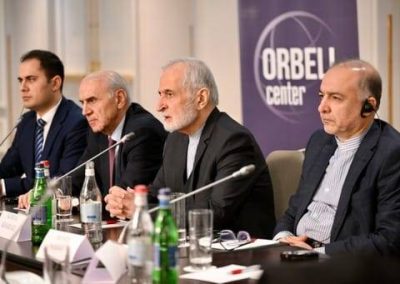In his speech, Dr. Seyed Kamal Kharrazi, referring to the historical and friendly relations between Iran and Armenia and the determination of the Islamic Republic of Iran to expand these relations, discussed the current developments in the Caucasus region and presented a comprehensive analysis of the unstable situation in this region.
The President of the Strategic Council on Foreign Relations emphasized that the Islamic Republic of Iran supports the independence, sovereignty, and territorial integrity of all countries in this region and does not accept the change of geographical borders under any circumstances.
Referring to the economic capacities of the Caucasus region, he said that Iran, as the axis connecting the North-South and East-West transportation routes, is ready to put its economic and scientific capacities at the service of the development and progress of this region.
The visit of Dr. Kharrazi, The President of the Strategic Council on Foreign Relations, to Armenia is a continuation of his periodic trips to the countries of the region and neighboring areas and to examine the strategies of the Islamic Republic of Iran in the Caucasus region.
Yesterday, Dr. Kharrazi met and talked with Mr. Pashinyan, Prime Minister, Mirzoyan, Minister of Foreign Affairs, and Grigoryan, Secretary of the National Security Council of Armenia, as well as some heads and professors of the study centers of that country.
Subsequently, he will travel to other countries of the Caucasus region.













0 Comments